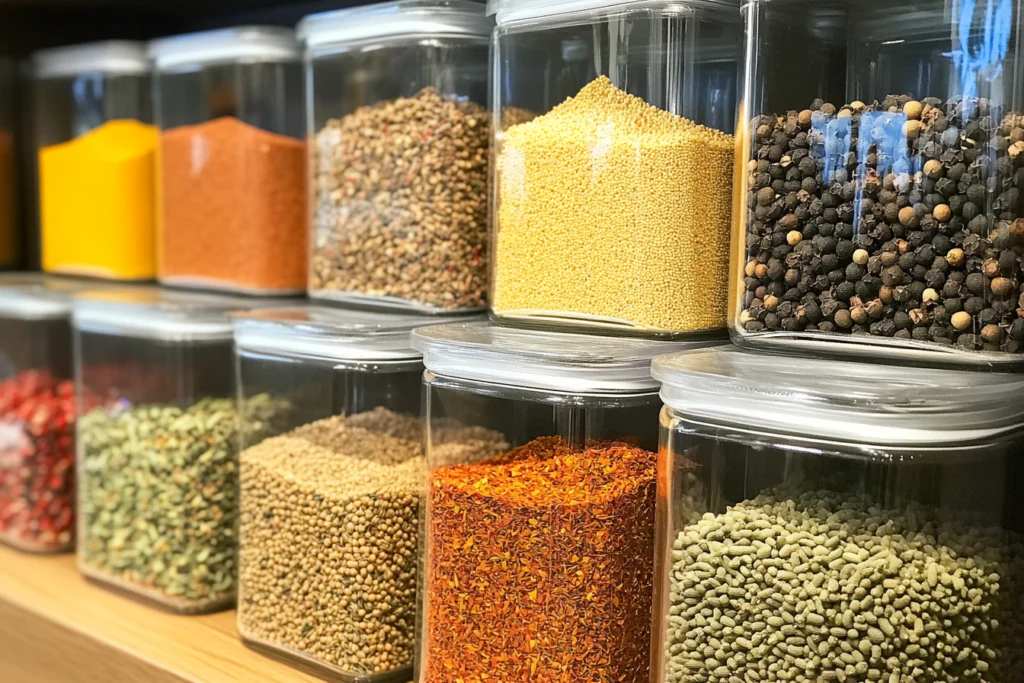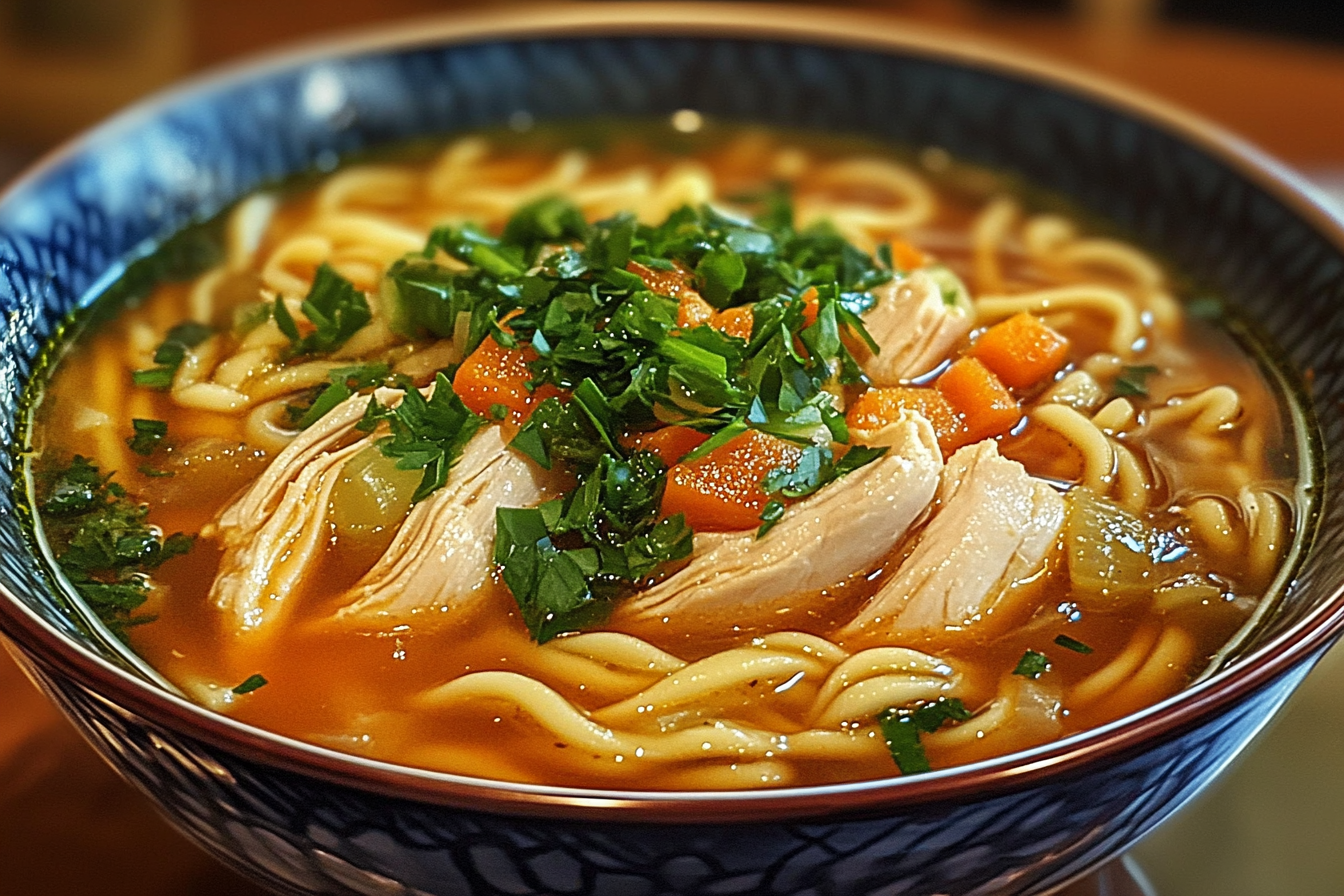Chicken noodle soup has long been regarded as a comforting dish, especially when you’re feeling under the weather. But does it go beyond being a nostalgic remedy? Many wonder: Is chicken noodle soup anti-inflammatory? This question is essential because inflammation plays a central role in many chronic illnesses. In this article, we’ll consider the nutritional components of chicken noodle soup and its potential anti-inflammatory effects, supported by scientific evidence.
The Nutritional Profile of Chicken Noodle Soup
Chicken noodle soup is more than just a flavorful broth with noodles. Its nutritional profile provides essential vitamins, minerals, and proteins that support overall health. The primary ingredients—chicken, broth, vegetables, and spices—are packed with nutrients:
- Protein from chicken helps repair tissues and supports the immune system.
- Vitamin A and vitamin C from vegetables like carrots and celery boost immunity.
- Minerals, including potassium and magnesium, are vital for muscle and nerve function.
- Collagen in the broth promotes joint health and skin elasticity.
These components work synergistically to nourish the body while potentially reducing inflammation.
Understanding Inflammation
To determine if chicken noodle soup is anti-inflammatory, it’s crucial to understand what inflammation is. Inflammation is the body’s natural response to injury or infection, often characterized by redness, swelling, and pain. There are two main types:
- Acute Inflammation: A short-term, protective response that helps the body heal.
- Chronic Inflammation: A prolonged condition linked to diseases like arthritis, diabetes, and heart disease.
Diet plays a significant role in managing inflammation. Anti-inflammatory foods, such as those found in chicken noodle soup, may help reduce chronic inflammation and improve overall health.
Scientific Studies on Chicken Noodle Soup
Research has examined whether chicken noodle soup is anti-inflammatory, and the findings are promising. A notable study from the University of Nebraska Medical Center found that chicken soup inhibits the movement of neutrophils, which are white blood cells responsible for inflammation. This could reduce upper respiratory symptoms during colds.
Additionally:
- Broth-based soups are hydrating, aiding in the removal of toxins that can exacerbate inflammation.
- Anti-inflammatory compounds in vegetables and spices, like beta-carotene and gingerols, further increase the soup’s effects.
These studies suggest that chicken noodle soup can be a supportive food for reducing inflammation and promoting recovery.
Broth: The Heart of the Soup
The broth forms the foundation of chicken noodle soup and offers several anti-inflammatory benefits:
- Bone broth is rich in collagen, gelatin, and amino acids like glycine and proline, which help reduce gut inflammation.
- The hydration provided by broth supports the body’s natural detox processes.
- Minerals like magnesium and calcium strengthen the immune system and reduce oxidative stress, a key driver of inflammation.
A homemade broth often contains fewer preservatives than store-bought options, enhancing its anti-inflammatory properties.
The Role of Chicken
Chicken, a lean source of protein, is a cornerstone of this soup. But why is it important for inflammation?

- Amino acids such as cysteine are released during cooking. These compounds help thin mucus in the respiratory tract and ease cold symptoms.
- Protein in chicken supports tissue repair and immune function.
- It contains selenium, a mineral with antioxidant properties that reduce oxidative damage linked to inflammation.
When combined with the broth and vegetables, chicken amplifies the soup’s ability to reduce inflammatory responses.
Vegetables: Nature’s Healers
Vegetables are the unsung heroes of chicken noodle soup. They provide an array of phytonutrients and vitamins essential for combating inflammation.
- Carrots: Packed with beta-carotene, an antioxidant that reduces inflammation and boosts immunity.
- Celery: Contains luteolin, a compound with potent anti-inflammatory properties.
- Onions and Garlic: Rich in sulfur compounds that fight inflammation and improve the immune response.
- Leafy greens (if added): Provide vitamin K, which helps regulate the body’s inflammatory processes.
Including a variety of vegetables insures that chicken noodle soup is not only flavorful but also a powerhouse of anti-inflammatory nutrients.
Herbs and Spices in Chicken Noodle Soup
Herbs and spices hoist chicken noodle soup from a simple dish to a therapeutic remedy. Some key additions include:

- Turmeric: Known for its active compound curcumin, turmeric is one of the most potent natural anti-inflammatory agents.
- Black Pepper: Increases the absorption of curcumin from turmeric.
- Parsley: Contains flavonoids and vitamins that reduce oxidative stress and inflammation.
- Thyme: Has antimicrobial properties and aids in respiratory health.
- Ginger: Adds a warm, zesty flavour while combating inflammation with its gingerols.
These ingredients work in harmony to increase the soup’s anti-inflammatory benefits and overall taste.
So, is chicken noodle soup anti-inflammatory? Based on its nutrient-dense ingredients, scientific research, and traditional use, the answer appears to be yes. The combination of protein-rich chicken, vegetable-based antioxidants, and anti-inflammatory spices makes this dish not just comforting but also healing. Adding homemade broth further amplifies its health benefits.
Whether you’re seeking relief from a cold or managing chronic inflammation, a bowl of chicken noodle soup can be a delicious and effective way to support your health.
How Chicken Noodle Soup Supports Immunity
Chicken noodle soup has long been a comforting remedy for colds and flu, but does it really support immunity? The answer lies in its nutrient-rich composition. This traditional dish contains a combination of anti-inflammatory and immune-boosting ingredients, such as chicken, vegetables, and broth.
- Chicken provides a high-quality source of protein, essential for the production of white blood cells.
- Vegetables like carrots, celery, and onions are packed with vitamins A and C, which help strengthen the immune system.
- Broth, especially if made from scratch, contains collagen and amino acids like cysteine, which may have anti-inflammatory properties.
The steaming heat of the soup can also help soothe nasal congestion and promote hydration. Combined with the calming effect of warm liquids, it makes chicken noodle soup a staple for wellness routines.
Homemade vs. Store-Bought
When it comes to choosing between homemade and store-bought chicken noodle soup, there are significant differences in nutritional value, flavour, and health benefits.
Homemade Chicken Noodle Soup:
- Made with fresh, customizable ingredients.
- Often contains less sodium and fewer preservatives.
- Allows the inclusion of anti-inflammatory spices like turmeric or ginger.
Store-Bought Options:
- Convenient and ready to eat, but often high in sodium and low in fresh vegetables.
- It may contain artificial flavours or additives that reduce nutritional quality.
- Rarely offers the same level of anti-inflammatory benefits as homemade versions.
If you’re asking, Is chicken noodle soup anti-inflammatory? The answer leans heavily towards homemade. Crafting your soup allows for the inclusion of high-quality, fresh ingredients that maximize its health potential.
Cultural Significance of Chicken Noodle Soup
Chicken noodle soup transcends borders and cultures, serving as a universal comfort food. Its roots can be traced to various traditions around the world, each emphasizing its nourishing and healing properties.
- In the United States, it’s often referred to as “Jewish penicillin” for its perceived ability to ward off illness.
- In China, chicken soup is enriched with herbs like goji berries to boost energy and immunity.
- In Latin America, variations like caldo de pollo incorporate lime and cilantro for added zest and nutrition.
The widespread use of chicken noodle soup reflects its universal appeal as a healing dish. Across cultures, it is seen as both a remedy and a symbol of care. Learn more about enhancing soup with this golden spice in Turmeric Chicken Noodle Soup: Creative Flavors and Expert Secrets.
How to Maximize the Benefits
To maximize the health benefits of chicken noodle soup, consider the following tips:
- Use Bone Broth: Bone broth is rich in collagen, minerals, and amino acids that may increase gut health and reduce inflammation.
- Add Anti-Inflammatory Spices: Turmeric, ginger, and garlic are excellent additions. These ingredients are well known for their anti-inflammatory properties.
- Incorporate Leafy Greens: Spinach or kale can boost the soup’s vitamin and mineral content.
- Choose Whole-Grain Noodles: Swap traditional pasta for whole-grain or gluten-free options to improve the soup’s nutritional profile.
By customizing your soup with these ingredients, you can assure it answers the question, Is chicken noodle soup anti-inflammatory? Positively and effectively. Consider more about turmeric’s magical benefits in soups and beyond in Transform Your Soup: The Surprising Benefits and Magic of Turmeric.
Common Myths About Chicken Noodle Soup
There are several myths surrounding chicken noodle soup, some of which may influence how we perceive its benefits.
- Myth: Chicken noodle soup cures illnesses.
- Fact: While the soup is nutritious and comforting, it does not cure diseases. It primarily helps relieve symptoms and supports hydration.
- Myth: Any chicken soup is healthy.
- Fact: Store-bought versions often contain excess sodium and lack fresh ingredients, reducing their nutritional value.
- Myth: Chicken noodle soup is only for colds.
- Fact: Its anti-inflammatory properties and nutrient density make it beneficial for overall wellness, not just during illness.
Understanding these myths helps set realistic expectations for the soup’s role in a balanced diet. Whether using traditional chicken broth or infusing it with turmeric, the result is a rich, health-boosting dish. Wondering if turmeric works well with other noodle dishes? Check out Can I Put Turmeric in My Noodles?.
FAQs
Q: Is chicken noodle soup anti-inflammatory?
A: Yes, especially when made with fresh ingredients and improved with anti-inflammatory spices like turmeric or garlic.
Q: Can vegetarians enjoy a similar soup?
A: Absolutely. A vegetarian version using vegetable broth, tofu, and anti-inflammatory spices can provide similar benefits.
Q: How often should I eat chicken noodle soup?
A: There’s no strict rule, but incorporating it into your diet during colder months or when feeling under the weather can provide added nutrients.
Q: Is it better to freeze homemade chicken noodle soup?
A: Yes, freezing insures that you always have a nutrient-rich meal on hand. Just store the noodles separately to avoid sogginess.
Chicken noodle soup is more than just a comforting dish—it’s a powerhouse of nutrients and potential health benefits. From its anti-inflammatory ingredients to its cultural importance, this soup offers more than meets the eye. Homemade versions stand out for their superior nutritional quality, making them the ideal choice for those asking, Is chicken noodle soup anti-inflammatory?
By understanding how to increase its benefits and debunking common myths, you can make chicken noodle soup a staple of your wellness routine. Embrace the simplicity and versatility of this timeless dish, and enjoy its warmth and nourishment all year round.

